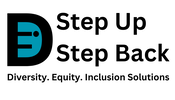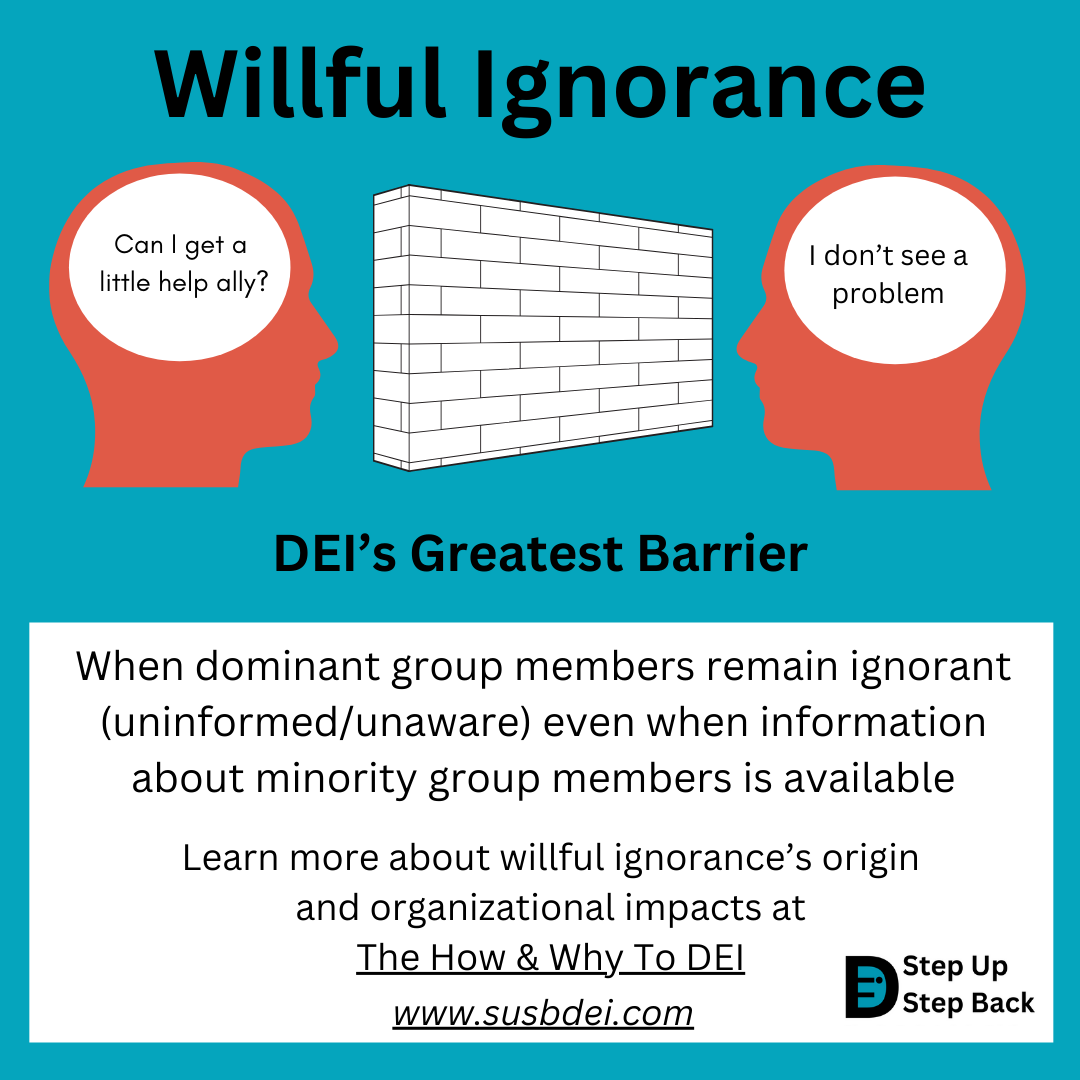|
Why should leaders care about willful ignorance? Willful ignorance is the starting point for allyship when guided by DEI’s three core principles (diversity, equity, and inclusion) to create large-scale behavior change. This ongoing allyship work begins with the individual as a leader. The leader is responsible for having a vision that shapes the organizational culture. The organizational culture influences the quality of products/services offered to customers. Long term brand loyalty occurs when the customers' needs are met by the product/services offered and they align with the organizational culture and the leader’s vision. This is especially true in the growing market of DEI informed consumers, including Millennials and Gen Zers who “prefer to buy from ethical brands that truly care about people and the planet” (SWNS, 2023). This creates three tiers of behavior change impacted by DEI; leader, organization, and customer. To successfully incorporate DEI behavior change on multiple levels, willful ignorance must be recognized as a key component to better inform organizational DEI, beginning with the leader. DEI Intro to Willful Ignorance
Willful ignorance is a foundational DEI term used to address root issues of inequity instead of remaining surface level by focusing on “how to just get along.” In Is everyone really equal? by Özlem Sensoy and Robin DiAngelo willful ignorance is described as “dominant group members claim that they simply don’t know about the minority group, invoking a sense of innocence, the information is easily available” (Sensoy & DiAngelo, 2017). In action, this can look like a person of the dominant group (able bodied, neurotypical, White, heterosexual, cisgendered, male, etc.) continuing to say things or act in a manner that harms marginalized people despite the accessibility of numerous avenues for self education. Resources that are readily available can include; using the internet to watch interviews or documentaries, signing up for DEI coaching/training, checking out a library book about counter narratives (alternative recordings of events) or connecting with local community centers of marginalized groups to learn more. We are fortunate to have access to a world of knowledge with a swipe of a single finger. DEI Leadership Willful Ignorance In DEI leadership, I define willful ignorance as the behavior when dominant group members remain ignorant (unaware or uniformed) even when information about the minority group members is available. Willful ignorance is an addiction to power caused by our privilege. From a DEI perspective, privilege is defined as a taken for granted access that allows comfort and familiarity. Historically in human evolution, seeking familiarity and comfort was a survival strategy to minimize fatal risk taking such as avoidance of situations that were uncomfortable or unfamiliar. In modern day life, we have more stability and security which renders our ancient apprehensions less relevant and dire. Willful ignorance clings to those ancient and poorly adapted habits at the expense of our own self sabotage. Willful ignorance in organizations can look like clinging to past traditions and a status quo that excludes minority group members from fully participating and bringing their true identities to work. In turn, dominant group members and the organization as a whole create products/services that fail to meet the needs of consumers and make decisions that are ill-informed, costing money, time, labor, and emotional health. How To Address Willful Ignorance In order to be allies, we must seek out primary sources (people who were actually there during the event), this allows us to learn multiple sides of the story to develop our own empathy. It is not necessary to agree with others, however it is necessary that we understand where the other person is coming from. As dominant group members, we are responsible for educating ourselves about minority group members who are different from us. When we consciously decide to take action as an individual, we are seeking to better understand our willful ignorance and the experiences of others. This causes a shift in our perspective by prioritizing empathetic consideration before we give in to the familiarity and comfort of our privilege afforded by our willful ignorance. In addition, this alleviates the burden placed on minority group members to educate dominant group members who may risk losing their jobs or relationships when they explain less popular or unfamiliar personal experiences and truths. DEI behavior change is a long term and ongoing commitment as we continue to develop our personal identity. This can be especially challenging when we mistake personal growth as an attack on our personal values and identity. Personal growth takes the form of considering new empathetic perspectives that we may not do not agree with because discomfort creates change. Oftentimes our past experiences, values, and morals that we grew up with directly shaped who we are and we may even attribute our success in life to them. In the past those experiences were helpful and relevant, but at this point in our lives we must consciously choose to acknowledge that our willful ignorance as dominant group members has BOTH aided in our success and harmed others. Takeaways In closing, as a leader willful ignorance is a useful phrase that you can use to self identify behavior patterns and employ it as a tool to communicate your allyship with minority group members. The point of this article is not to shame or guilt a person nor point the blame finger. The value of this article is to name a common trend behavior, increase our self awareness, and bring ourselves one step closer to creating large-scale equitable change for ourselves and eventually society as a whole. As leaders, we need these specific key terms and DEI principles to guide our progress by ensuring continued focus on DEI outcomes, direction during organizational uncertainty, and exemplary allyship behavior. May the year of the Dragon shine on your leadership growth and success! Let me know your thoughts on willful ignorance. Is this a term that resonates with you? Have you ever heard of this term before? How might it be useful for you? References SWNS, (2023). Most Gen Z and Millenials based purchases on brand’s mission: poll. New York Post. Accessed February 15, 2024. https://nypost.com/2023/08/22/most-gen-z-millennials-base-purchases-on-brands-mission-poll/ Sensoy, Özlem. DiAngelo, Robin (2017). Is everyone really equal?. Teachers College Press.
0 Comments
Leave a Reply. |
Learn & ExploreBlog posts to expand your leadership knowledge and increase your exposure to DEI Archives
June 2024
Categories |
Proudly powered by Weebly


 RSS Feed
RSS Feed